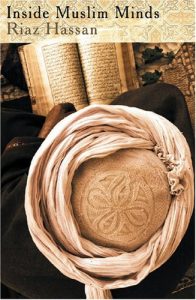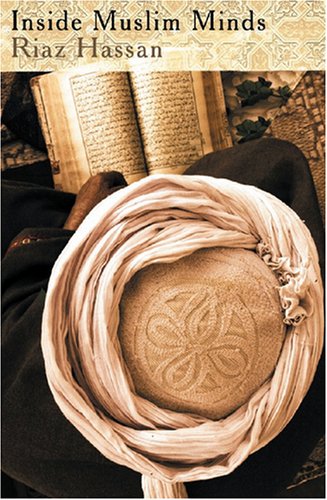 Such violent, repulsive and publicly visible acts could be interpreted as the by-product of social malignancies that have festered for a long time. Dr Khaled Abou El Fadl—an eminent Islamic jurist . . . . —provides a succinct description of how historical and social conditions interact to form a particular mentality . . . .
Such violent, repulsive and publicly visible acts could be interpreted as the by-product of social malignancies that have festered for a long time. Dr Khaled Abou El Fadl—an eminent Islamic jurist . . . . —provides a succinct description of how historical and social conditions interact to form a particular mentality . . . .
[W]hen we speak about the meaning of Islam today, we are really talking about the product of cumulative enterprises that have generated communities of interpretation through a long span of history. (p. 37)
The shocking injustices and brutality in the Muslim world that we hear about far too often are not isolated acts of a few troubled psychopaths. They are systemic and carried out with considerable (though fortunately not always unanimous) popular support.
Such acts take place because of social dynamics that have desensitized and deconstructed a society’s sense of moral virtue and ethics. Theological constructs and social responses that tolerate the commission of acts of cruelty are the product of a long process of indoctrination and acculturation. Indoctrination facilitates their commission; acculturation mutes or mitigates the sense of outrage over the offensive behaviour. (p. 37)
Boiling the frog
Each act of barbarism becomes a historical precedent for further similar acts and for increasingly easier public acceptance. (As for indoctrination, we are also looking at how that works first hand.) Each act becomes another topic of community discussion; explanations and interpretations that emerge become part of the social group’s identity and moral foundations. Theological perspectives of these same events are meanwhile being transmitted through generations of families, communities and institutions. The point is that community interpretations and practices adapt, evolve, change emphases and focus over time and that’s true of most societies throughout history. So the question that arises is, What historical changes have been emerging in “recent” history in the Muslim world? And when we say “recent” we are reaching back to the eighteenth century when European powers made their first takeovers of large numbers of Muslim populations (e.g. India, Egypt).
Three responses to Western colonialism
To make sense of the incidents described, we need first to analyze three streams of Islamic consciousness that developed under the historical conditions faced by Muslim societies over the previous few centuries. Under the conditions of economic underdevelopment, technological backwardness and powerlessness prevailing today in the Muslim world, elements of these three streams have somehow fused to give rise to a new hybrid Islamic consciousness: salafabism . . . . (p. 38, my formatting and highlighting in all quotations)
As we saw in Jason Burke’s historical narrative Saudi Arabia used its windfall from rising oil prices in the 1970s to propagate its vicious brand of wahhabist Islam. In addition to wahhibism Fadl points his finger at two other strands of Islamic thought, the first being apologetics. Let’s take them in order.
Response 1: Apologetics
A common feature of most Muslim societies is a shared history of colonialism under European dominance. This sociopolitical experience was accompanied by a culture of orientalism: an assumption of Western superiority combined with a condescending trivialization of Islamic cultural achievements. The onslaught of these processes led not only to loss of power by political and religious elites in the lands of Islam, but also to the devaluation and deprecation of Islamic beliefs and institutions. The dominant intellectual response of Muslims to this challenge from around the mid-eighteenth century came from the apologetics. (p. 39)
Conquered peoples typically find ways to resist their conquerors even if only by symbolic means. Recall the way some Jewish leaders responded to the conquest of Judea by the Greco-Romans who justifiably took great pride in their cultural achievements. “Plato is so wonderful?” some Jews (and subsequently some Christians) challenged. “Ha! Plato filched all of his ideas from Moses!”
Among the conquered and humiliated Muslims were those who responded in a similar way to their Western overlords. Anything of value that the Europeans had produced was thought by Muslim apologists to have owed its origins to Islamic science or philosophy or political ideas.
According to apologists, Islam
- liberated women,
- created democracy,
- endorsed pluralism,
- protected human rights
- and introduced social welfare
long before these institutions ever existed in the West. One implication of this orientation was that, since Islam had invented most modern institutions, there was no incentive to engage in any further thinking or analysis, except on very marginal issues. (p. 40)
So it was that Western orientalists (those who looked down upon oriental culture, ways and beliefs with a certain contempt) found themselves mirrored by Muslim apologists who in turn looked down upon Westerners with the same disdain. That’s one time-honoured way of a defeated people holding on to their self-worth and dignity.
But that kind of response has a serious down-side: it ossifies one’s religion.
Religion is no longer an evolving and adapting system that is constantly being critically studied and subject to adaptation in the face of new circumstances. An idealized construct is created, and this is sanctified and set in stone as a foundational golden age. Anything that falls short of that ideal is the fault of the enemy. Trying to cope with the humiliation that came with European conquest and hegemony some Muslims found refuge in a conviction that their ancient texts, ways, beliefs had from the beginning of time been superior and well in advance of anything associated with their new rulers.
So for Muslim apologists the superiority of Islam became a mirror reaction to their European masters’ presumptions of superiority. As cultural arrogance made it impossible for Europeans to bend and adapt so the same arrogance of apologists made it impossible for them to analyse and adapt their own traditions and belief systems.
Apologists treated the Islamic tradition as if it had fossilized at the time of the Prophet and the Rightly Guided Companions (the four Caliphs who succeeded Muhammad).
And if there is nothing to reflect upon except to bask in the superiority of one’s beliefs then anyone can become an authority. The true Muslim intellectuals are marginalized into irrelevancy. The door is open to anyone becoming “the voice” of “truth”. The solutions become easy. If the Muslim peoples are under the boot of the aliens, unable to match the Westerners in political and military might and so liberate themselves, it is because Muslims are not faithful and devout enough.
The way to liberation and self-respect, apologists believed, was to become more fervently dedicated to the myth of the old ways. And those old ways proved to have even preceded the best the West had to offer such as democracies and human rights.
Islamic apologists were ultimately motivated by nationalistic aspirations for political, social and cultural independence from the West.
Islam thus came to be seen as a kind of anti-colonialist resistance ideology capable of restoring Muslim pride and political power. Political liberation anchored itself in a religious orientation that was puritanical, supremacist and opportunistic. (p. 41)
That was one response. The other two I’ll cover in another post. We also need to examine the empirical evidence of how these different types of responses took hold in varying degrees in different regions of Muslim peoples and fused into an ugly ideology. We will see that those differences can be correlated with respective historical experiences with the West.
Like this:
Like Loading...









